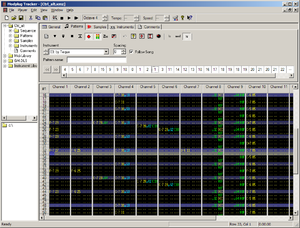- OpenMPT
-
ModPlug Tracker 
Original author(s) Olivier Lapicque Stable release 1.19.04.00 / September 9, 2011 Written in C++ Operating system Windows Platform x86 Available in English Type Tracker License BSD (since OpenMPT 1.17.02.53) / GPL Website http://openmpt.org/, http://www.modplug.com/ OpenMPT is an open source audio module tracker for Windows. It was named by Computer Music as one of the top five free music trackers.[1] It originally started out under the name ModPlug Tracker, and was developed by Olivier Lapicque in September 1997.[2]
Contents
History
ModPlug code origins
Originally called ModPlug Tracker, it was initially developed as a plug-in named MOD Plugin for Internet browsers,[3] to allow users to listen to music modules (for example, IT, XM, S3M, and MOD) present in some websites. ModPlug Tracker, along with a player application named ModPlug Player later evolved from this plug-in.[4]
In December 1999, Olivier Lapicque sent the module-playing parts of ModPlug Tracker's source code to Kenton Varda, under the GPL, to write a plugin for XMMS based on the code. The source code was later released to the public domain, and the mod-playing code was split off into a separate library, libmodplug, maintained as part of the ModPlug XMMS Plugin project. This project lay dormant from late 2003 until early 2006, when it was picked up again. Today, libmodplug is included in many Linux distributions as a default audio plugin for playing module files.
Due to lack of time, Olivier Lapicque discontinued development of ModPlug Tracker itself, and in early 2004, he released the entire source code under an open license. The ModPlug Player sourcecode is still closed as of July 2010.
OpenMPT
Lapicque's MPT code was taken up by a group of trackers/programmers at SourceForge and is now known as OpenMPT. The OpenMPT is under active development and distributed as free software under the terms of the BSD license, before version 1.17.02.53 under the GNU General Public License. The Schism Tracker is a sister project also based on the ModPlug code which introduced several backports of bugfixes to the OpenMPT.[5]
Usage
OpenMPT's main distinguishing feature is its native Windows user interface. Most trackers, even newer ones such as Renoise, have interfaces modelled after the older DOS trackers such as FastTracker II. OpenMPT makes use of features common to Microsoft Windows programs, such as context menus for effect selection, "tree" views (for files, samples, and patterns), drag and drop functionality throughout, and the native Look and Feel of the Windows platform.
It supports both loading and saving of IT (Impulse Tracker), XM (FastTracker Extended Module), MOD (Protracker and similar), S3M (Scream Tracker 3) and MPTM (its own file format) files, imports many sample file formats, and has some support for DLS banks and soundfonts.[6]
The MPT was also one the first Trackers which supports opening and editing of multiple tracker modules in parallel. MPT supports up to 127 tracks/channels, VST Plugins, VST instruments and has ASIO support.[6]
MPTM file format
Due to limitations of the various file formats it is able to save, a new module format called MPTM was created in 2007.[7] However, the format is still in experimental stage and is expected to be changed in the future.[8]
OpenMPT had previously introduced non-standard additions to the older file formats. For example, one can use stereo samples or add VST Plugins to XM and IT modules, which were not supported in the original trackers.
References
- ^ "Top Trackers". Computer Music Magazine (Future Publishing Ltd) (113). June 2007. http://www.musicradar.com/computermusic/computer-music-june-issue-cmu113-on-sale-now-246001. Retrieved 2007. "Tracker! The amazing free music software giving the big boys a run for their money."
- ^ ModPlugTrackerv1.00alpha5.rar - from ftp.modland.com/pub/trackers
- ^ Christe, Ian (1997-10-30). "A Cheat Sheet for Internet Sound". Wired.com. Archived from the original on 1998-12-06. http://web.archive.org/web/19981206062519/www.wired.com/news/news/culture/sonic_boom/story/7978.html. Retrieved 2011-02-05. "MOD: The lingua franca of the Internet's large network of Amiga musicians, MODs are ingenious self-contained sound files that include raw audio data and sequencing information.(Link to modplugcentral)"
- ^ "MODPlug Central - Technical Support Features". MODPlug Central. 1998-02-22. Archived from the original on 1998-02-22. http://web.archive.org/web/19980222214727/www.castlex.com/modplug/tech.html. Retrieved 2011-02-05.
- ^ storlek (2011-02-01). "Modplug" (in englisch). schismtracker.org. http://schismtracker.org/wiki/Modplug. Retrieved 2011-02-05. "Schism Tracker uses a highly customized version of the Modplug library, [...]. Many of Schism's fixes have since been back-ported to OpenMPT [...]"
- ^ a b "Features". openmpt.org. 2011-02-05. http://openmpt.org/features. Retrieved 2011-02-05.
- ^ ModPlug Central Forums
- ^ OpenMPT developer board
External links
- OpenMPT : The official homepage of the OpenMPT project.
- ModPlug Central : ModPlug Tracker, Player and Plugin homepage.
- MODPlug Tracker Project Site on SourceForge
- Original Modplug Website
- Modplug XMMS Plugin (using libmodplug)
- #modplug on EsperNet - discussion and support
Categories:- Audio trackers
- Free audio software
- Free software programmed in C++
- Windows-only free software
- Public domain software
Wikimedia Foundation. 2010.
